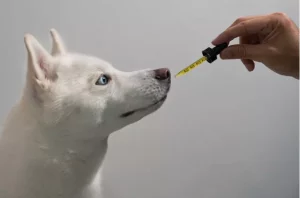Omega-3 Fatty Acids and Their Role in Promoting Canine Health
Omega-3 Fatty Acids

Omega 3 is one of the most effective supplements found in dietaries. It is good for humans to consume and recent studies have shown, this fatty acid carries various health benefits for dogs. Omega 3 can not be synthesized in the body so it must be provided through diet. Let us tell you more about omega-3 fatty acids and their role in promoting canine health.
What are Omega-3 fatty acids?
Let’s start with defining what this supplement is. Omega-3 fatty acids are polyunsaturated fatty acids that are considered necessary. It is composed of Alpha-linolenic acid (ALA), Eicosapentaenoic acid (EPA), Docosahexaenoic acid (DHA).
Fats are an essential source of nutrients in dogs. Fats not only supply energy to canines but also help optimize other parts of their health. They aid in the normal functioning of nearly every organ in their body, including the eyes, brain, skin, coat, heart, lungs, immune system, endocrine system, and others. That is what makes Omega-3 fatty acids so important.
Benefits of Omega-3 Fatty Acids for Dogs
1. Promotes Brain Function:
Dogs need Omega-3 for improved cognitive function. Whether it’s to train, learn new behavior, or perform normal functions, a dog that is getting the required amount of fatty acids it needs will not face any trouble in performing these actions. Omega-3s have been shown to improve cognitive function, including memory and learning. Puppies often need high amounts of DHA and EPA in their systems to maintain proper function and brain development.
2. Boosts Immune System:
Omega-3 fatty acids have immune-boosting properties and can help strengthen your dog’s immune system. This can help reduce the risk of infections and illnesses.
3. Promotes Healthy Skin and Coat:
Omega-3s are known for their anti-inflammatory properties, which can help reduce skin irritation and promote a healthy, shiny coat. They can also help alleviate symptoms of skin allergies in dogs.
4. Reduces Risk of Heart Disease:
Omega-3 fatty acids have been shown to help reduce the risk of heart disease in dogs by lowering triglycerides, reducing blood pressure, and improving blood flow.
Best Sources of Omega 3 for Dogs
Knowing the advantages of omega-3 fatty acids for dogs, it’s important to know where to get them. Fish oil and plant-based alternatives such as flaxseed oil and chia seeds are the most popular sources of omega-3s for dogs.
Fish oil is the most popular source of omega-3s for dogs. It contains two essential fatty acids – eicosapentaenoic acid (EPA) and docosahexaenoic acid (DHA) – which are particularly important for promoting canine health. EPA and DHA are found in fatty fish such as salmon, mackerel, and sardines. If you choose to give your dog fish oil supplements, it’s important to choose a high-quality product that is specifically formulated for dogs. We recommend Skipper’s fish oil for dogs as it is sourced sustainably and offers a range of omega 3 and 6 for your dogs.
If you choose to give your dog fish oil supplements, it’s important to choose a high-quality product that is specifically formulated for dogs. We recommend Skipper’s fish oil for dogs as it is sourced sustainably and offers a range of omega 3 and 6 for your dogs.
Plant-based sources of omega-3s are also a good option for dogs. Flaxseed oil and chia seeds are both rich in alpha-linolenic acid (ALA), which the body can convert into EPA and DHA. However, it’s important to note that dogs may not be able to convert ALA as efficiently as humans, so these sources may not be as effective as fish oil.
How to Add Omega-3 Fatty Acids to Your Dog’s Diet
Now that you know the numerous benefits of Omega-3, keep an eye out on how to incorporate these fatty acids to your furry friend’s diet. There are several ways to do so, here are some tips:
1. Add Fish to Your Dog’s Diet:
If your dog enjoys eating fish, consider adding it to their regular diet. Fatty fish such as salmon or sardines are the best options, as they are rich in EPA and DHA.
2. Give Your Dog Fish Oil Supplements:
If your dog doesn’t like fish, or you’re not able to add it to their diet, fish oil supplements are a good alternative.
The Takeaway
To conclude, omega-3 fatty acids offer numerous health benefits for your pet. These fats are not produced within the dog’s body and need to be consumed through diet. Omega 3 boosts brain functionality, immune system, healthy fur, and much more. Call your veterinarian if you are unsure about anything, and follow their guidance in case you need help.




